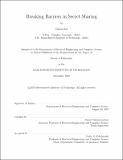| dc.contributor.advisor | Vinod Vaikuntanathan. | en_US |
| dc.contributor.author | Liu, Tianren,Ph. D.Massachusetts Institute of Technology. | en_US |
| dc.contributor.other | Massachusetts Institute of Technology. Department of Electrical Engineering and Computer Science. | en_US |
| dc.date.accessioned | 2020-03-09T18:58:37Z | |
| dc.date.available | 2020-03-09T18:58:37Z | |
| dc.date.copyright | 2019 | en_US |
| dc.date.issued | 2019 | en_US |
| dc.identifier.uri | https://hdl.handle.net/1721.1/124114 | |
| dc.description | This electronic version was submitted by the student author. The certified thesis is available in the Institute Archives and Special Collections. | en_US |
| dc.description | Thesis: Ph. D., Massachusetts Institute of Technology, Department of Electrical Engineering and Computer Science, 2019 | en_US |
| dc.description | Cataloged from student-submitted PDF version of thesis. | en_US |
| dc.description | Includes bibliographical references (pages 50-53). | en_US |
| dc.description.abstract | In this thesis, we study secret sharing schemes for general (non-threshold) access functions. In a secret sharing scheme for n parties associated to a monotone function [mathematical formula], a dealer distributes shares of a secret among n parties. Any subset of parties [mathematical formula] can jointly reconstruct the secret if F(T) = 1, and should have no information about the secret if F(T) = 0. One of the major long-standing questions in information-theoretic cryptography is to determine the minimum size of the shares in a secret-sharing scheme for an access function F. There is an exponential gap between lower and upper bounds for share size: the best known scheme for general monotone functions has shares of size 2[superscript n-o(n)], while the best lower bound is n² / log(n). In this thesis, we improve this more-than-30-year-old upper bound by construct- ing a secret sharing scheme for any access function with shares of size 2[superscript 0.994n] and a linear secret sharing scheme for any access function with shares of size 2[superscript 0.994n]. As a contribution of independent interest, we also construct a secret sharing scheme with shares of size [mathematical formula] for a family of [mathematical formula] monotone access functions, out of a total of [mathematical formula] of them. As an intermediate result, we construct the first conditional disclosure of secrets (CDS) with sub-exponential communication complexity. CDS is a variant of secret sharing, in which a group of parties want to disclose a secret to a referee the parties' respective inputs satisfy some predicate. The key conceptual contribution of this thesis is a novel connection between secret sharing and CDS, and the notion of (2-server, information-theoretic) private information retrieval. | en_US |
| dc.description.statementofresponsibility | by Tianren Liu. | en_US |
| dc.format.extent | 53 pages | en_US |
| dc.language.iso | eng | en_US |
| dc.publisher | Massachusetts Institute of Technology | en_US |
| dc.rights | MIT theses are protected by copyright. They may be viewed, downloaded, or printed from this source but further reproduction or distribution in any format is prohibited without written permission. | en_US |
| dc.rights.uri | http://dspace.mit.edu/handle/1721.1/7582 | en_US |
| dc.subject | Electrical Engineering and Computer Science. | en_US |
| dc.title | Breaking barriers in secret sharing | en_US |
| dc.type | Thesis | en_US |
| dc.description.degree | Ph. D. | en_US |
| dc.contributor.department | Massachusetts Institute of Technology. Department of Electrical Engineering and Computer Science | en_US |
| dc.identifier.oclc | 1142177906 | en_US |
| dc.description.collection | Ph.D. Massachusetts Institute of Technology, Department of Electrical Engineering and Computer Science | en_US |
| dspace.imported | 2020-03-09T18:58:36Z | en_US |
| mit.thesis.degree | Doctoral | en_US |
| mit.thesis.department | EECS | en_US |
